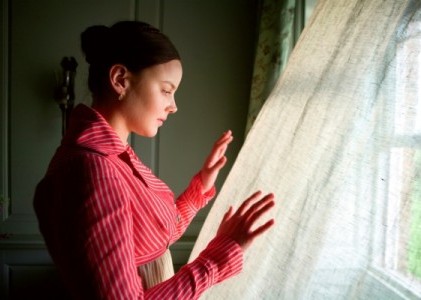Inconvenient Women
John Keats was small and tough, impulsive, pugnacious; some of his letters evoke a clever child turning cartwheels to stave off his bedtime. His early impressions of Fanny Brawne follow the rules of playground courtship, pulling on the pigtails of the girl he likes best: “Her arms are good her hands badish—her feet tolerable....She is not seventeen—but she is ignorant—monstrous in her behavior flying out in all directions, calling people such names that I was forced lately to make use of the term Minx.” Miss Brawne’s minxiness was only girlish pretension, he added; the affectation stemmed “not from any innate vice but from a penchant she has for acting stylishly. I am however tired of such style and shall decline any more of it.” Swearing off the object of your infatuation never goes out of fashion.
Jane Campion’s Bright Star gives us not a brash or bratty Keats, but textbook emo-Keats: feline and kind, delicate and almost vaporous, a little histrionic; Nick Drake with a cough he caught from Conor Oberst. (The actor who plays Keats, Ben Whishaw, is an experienced rock star, having done Rimbaud-as-Dylan in I’m Not There, Keith Richards in Stoned, and, in 2004 at the Old Vic, the only age-appropriate Hamlet I’ve ever seen.) For her part, Fanny Brawne (Abbie Cornish) is textbook Campion: an inconvenient woman. In Bright Star’s 1818 Hampstead, a monstrous minx is simply one who makes her own clothes (and boasts of making her own money from it) and who deflects unwanted attentions, in this case from boorish Charles Armitage Brown (Paul Schneider), Keats’s amanuensis and self-appointed gatekeeper, and Bright Star’s semi-villain.
Fanny is always a vision: resplendent in red Regency top hat and yellow feathers, or modeling her self-designed “triple-pleated mushroom collar” (the first of its kind in Hampstead!). She is conspicuous, and therefore problematic, as is typically the case with Campion’s women. The fleshy, squalling title character of Sweetie (1989) is a big baby id, and she dies for it. Janet Frame in An Angel at My Table (1990) is sad and painfully shy, and she is institutionalized for it. The hippie-dippy seeker of Holy Smoke (1999) finds a spiritual high in India, and her Australian family all but imprisons her for it; likewise, the mute mail-order bride in The Piano (1993) and the inscrutable Isabel Archer in The Portrait of a Lady (1996) are assigned their own marital cells to pace around in.
Ostensibly, Fanny’s constraints aren’t as tight, not least because she has such a wonderful mother (Kerry Fox, who played the adult Janet Frame in An Angel at My Table). But she is rarely permitted solitude; even by the time she is wandering the heath in mourning garb, her younger brother, Samuel (Thomas Sangster), still trails somberly behind as her chaperone. Her affections for Keats are restrained both by custom—she cannot marry a penniless poet—and by the snarling guard dog Brown, who seems half in love with both Fanny and Keats. (Well, maybe he’s more than half in love with Keats.) To the menfolk, Fanny’s designs seem like evidence not of artistry but frivolity, a misperception that Campion kindly preempts with the film’s first shot: a close-up of needle and thread pushing and pulling through snow-white cloth. The virginal connotation is as big as the screen, but so is the equivalence of Fanny’s labors of love and Campion’s.
Rarely leaving Fanny’s side, Bright Star is the literal version of first love as a matter of life and death, and its mood swings career according to the bipolarity of late adolescence: between rapture and despair, pleasurable boredom and borderline hysteria. Like its heroine, the movie is besotted with Keats, who has long been a cameo player in Campion’s movies, whether in the form of a schoolgirl reciting “Ode to a Nightingale” in An Angel at My Table—Campion’s other film about a famous writer—or Meg Ryan murmuring lines from “La Belle Dame Sans Merci” in In the Cut (2003). As in Angel, however, Campion isn’t all that interested in dramatizing the creative process. We see Janet Frame and John Keats carving out time and space (not always successfully) to write, but not the usual shorthand of the quill hovering wetly above the page or the light of inspiration flickering on a face. Angel and Star share a certain matter-of-fact impressionism: Wary of exposition, Campion shapes a linear narrative into a mosaic of crystallizing moments—most arrestingly when Keats takes a gorgeous nap atop a cherry tree. (The films also share a genius for casting child actors: lanky, huge-eyed Sangster looks like he’s ambled off a yellowed page of Dickens, while Edie Martin as little sister Toots is a Greuze painting come to life.)
Bright Star comes out strongly in favor of naps, in fact. Its tragedy is bottomless (Cornish is heartbreaking), yet the movie devotes itself just as avidly to the serener stuff of watching minds and bodies wander, absently or happily or what they will: strolling, dozily reading, gazing out the window, watching the wind stir the curtains or the trees. Because the chronology is so compressed (the lovers met in the late summer of 1818 and saw each other for the last time in September 1820), the film is able to luxuriate in the changing of the seasons and the giddy languor of being young and—until Keats falls ill—unscheduled. Though it hinges on a life and love desperately short on time, Bright Star testifies to the fertile pleasures of letting time slip caressingly through your fingers. A line from “Ode on Indolence” provides the ideal alternate title: Ripe Was the Drowsy Hour. ![]()
LATEST ARTICLES
-20140814-173707-thumb3.jpg)
Fighting Words
by Imogen Sara Smith
posted August 12, 2014

Fighting Words, Part 2
by Imogen Sara Smith
posted August 20, 2014

On the Margins: The Fil…
by Andrew Chan
posted August 12, 2014

Robin Williams: A Sense…
by David Schwartz
posted August 12, 2014
 Inconvenient Women
Inconvenient Women

